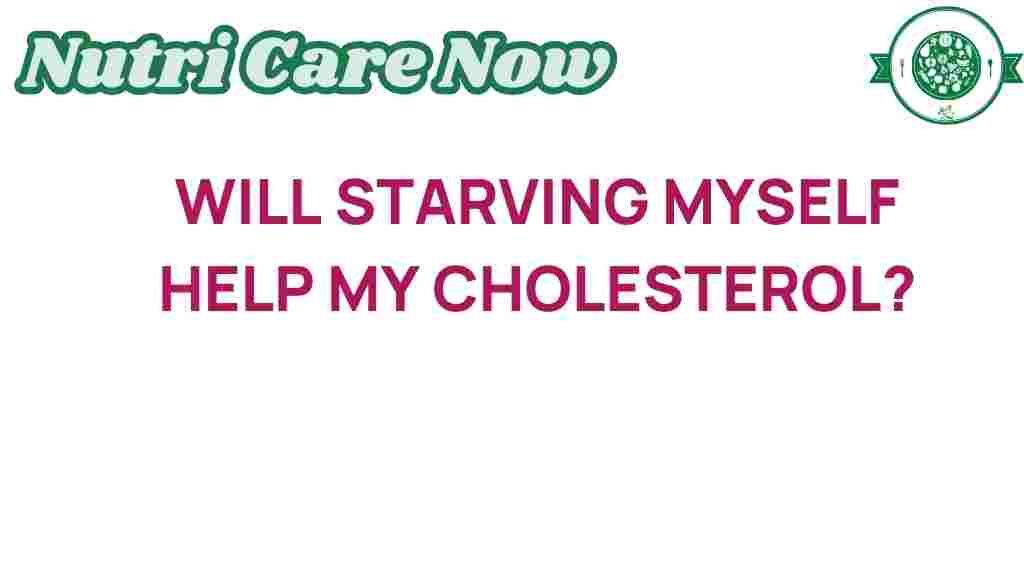The Surprising Truth: Can Starvation Lower Cholesterol Levels?
Cholesterol is a term that frequently appears in conversations surrounding health, dieting, and heart health. As we navigate the complexities of nutrition and lifestyle changes, many individuals wonder about the impact of extreme dieting, including starvation, on cholesterol levels. Can depriving the body of food actually lead to lower cholesterol? In this article, we will explore this surprising truth, examining the relationship between starvation, cholesterol levels, health risks, and overall well-being.
Understanding Cholesterol and Its Importance
Cholesterol is a waxy substance found in your blood, essential for building cells and producing certain hormones. It is carried through the bloodstream by lipoproteins, primarily low-density lipoprotein (LDL) and high-density lipoprotein (HDL).
- LDL (Low-Density Lipoprotein): Often referred to as “bad” cholesterol, high levels of LDL can lead to plaque buildup in arteries, increasing the risk of heart disease.
- HDL (High-Density Lipoprotein): Known as “good” cholesterol, HDL helps remove LDL cholesterol from the bloodstream, reducing the risk of heart-related issues.
Maintaining a balanced level of cholesterol is crucial for heart health and overall metabolism. Let’s delve deeper into the relationship between dieting, health risks, and cholesterol levels.
The Impact of Dieting on Cholesterol
Dieting is often associated with weight loss and improved health. However, not all dieting methods are equal. Some may even pose health risks, particularly when they involve extreme caloric restriction or starvation.
- Nutrition: A well-balanced diet rich in fruits, vegetables, whole grains, and lean proteins can help regulate cholesterol levels.
- Weight Loss: Gradual weight loss through healthy eating habits can lower LDL cholesterol levels.
- Metabolism: Drastic changes in dietary habits can disrupt metabolism, potentially leading to higher cholesterol levels after resuming normal eating patterns.
Can Starvation Lower Cholesterol? The Science Behind It
Starvation, defined as a severe deficiency in caloric intake, can have complex effects on cholesterol levels. While some studies suggest that short-term starvation may lead to a decrease in cholesterol levels, the long-term implications can be detrimental.
Short-term Effects of Starvation on Cholesterol
During starvation, the body enters a state of ketosis, where it begins to break down fat for energy. This process can lead to:
- Lower LDL Levels: Some evidence indicates that short-term starvation can reduce LDL cholesterol levels due to decreased intake of saturated fats and refined carbohydrates.
- Increased HDL Levels: In certain cases, HDL levels may rise as the body adapts to using fat as its primary energy source.
Long-term Risks of Starvation
While the initial effects of starvation may seem beneficial, the long-term consequences can be alarming:
- Nutritional Deficiencies: Prolonged starvation can lead to deficiencies in essential vitamins and minerals, adversely affecting overall health.
- Metabolic Slowdown: Extended periods of low caloric intake can slow down metabolism, making it harder to maintain healthy cholesterol levels in the future.
- Rebound Weight Gain: Once normal eating resumes, individuals may experience rapid weight gain, often accompanied by increased LDL cholesterol levels.
It’s essential to approach weight loss and cholesterol management through sustainable lifestyle changes rather than extreme dieting strategies.
Healthy Lifestyle Changes for Managing Cholesterol
Instead of resorting to starvation, consider these healthy lifestyle changes that can help manage cholesterol levels effectively:
- Adopt a Balanced Diet: Focus on incorporating whole foods, healthy fats (like olive oil and avocados), and fiber-rich foods (such as oats and legumes) into your meals.
- Increase Physical Activity: Regular exercise can help raise HDL cholesterol and lower LDL cholesterol.
- Stay Hydrated: Drinking plenty of water supports overall metabolism and aids in digestion.
- Monitor Portion Sizes: Being mindful of portion sizes can help maintain a healthy weight without resorting to starvation.
Step-by-Step Process for Healthy Weight Loss and Cholesterol Management
To achieve sustainable weight loss and improve cholesterol levels, follow this structured approach:
- Consult a Healthcare Professional: Before making significant changes, consult with a doctor or registered dietitian to assess your health needs.
- Set Realistic Goals: Aim for gradual weight loss of 1-2 pounds per week, focusing on long-term habits rather than quick fixes.
- Create a Balanced Meal Plan: Design a meal plan that includes a variety of food groups, ensuring you receive adequate nutrition.
- Incorporate Regular Exercise: Aim for at least 150 minutes of moderate-intensity exercise per week, such as brisk walking or cycling.
- Track Your Progress: Keep a food and exercise journal to monitor your habits and make adjustments as needed.
Troubleshooting Common Issues
As you embark on this journey, you may encounter challenges. Here are some common issues and troubleshooting tips:
- Plateauing Weight Loss: If your weight loss stalls, reassess your caloric intake and exercise routine. You may need to adjust your plan to kickstart progress.
- Cravings for Unhealthy Foods: When cravings strike, focus on healthier alternatives or practice mindful eating to understand your hunger cues.
- Low Energy Levels: If you feel fatigued, ensure you’re consuming enough calories and nutrients to support your activity level.
Conclusion: The Balance Between Dieting and Health
While starvation may lead to a temporary decrease in cholesterol levels, the associated health risks far outweigh any potential benefits. Instead of extreme dieting, embracing sustainable lifestyle changes is key to achieving long-term heart health and managing cholesterol effectively. By adopting a balanced approach to nutrition, exercise, and overall wellness, you can lower your cholesterol levels safely and maintain a healthy weight.
For more information on heart health and dietary habits, consider visiting this resource. Remember, your health journey is unique, so always consult with a healthcare professional before making significant changes to your diet or lifestyle.
Take control of your health today and prioritize your well-being over quick fixes. Your heart will thank you!
This article is in the category Health and created by NutriCareNow Team

1 thought on “The Surprising Truth: Can Starvation Lower Cholesterol Levels?”